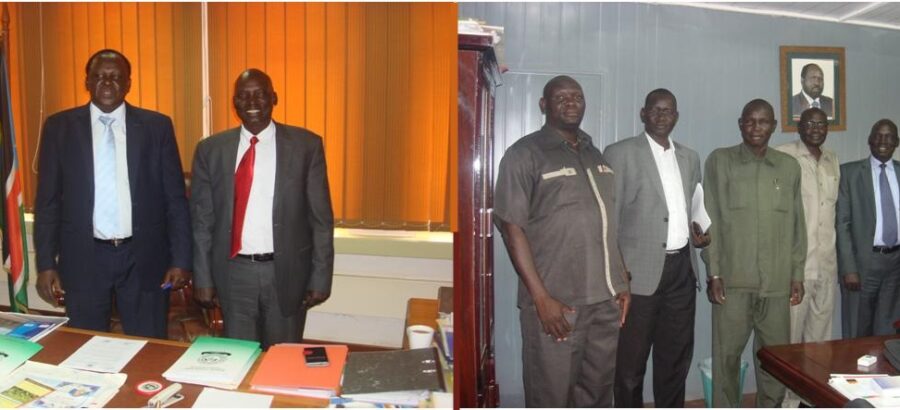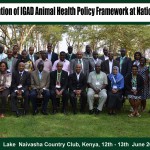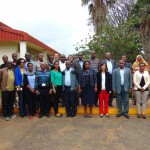Background:
In 2009, the IGAD members of Parliament proposed that IGAD establishes a dry land training institution and technical centre to promote bio-prospecting and bio-enterprises. In December 2009, the IGAD Ministers, responsible for livestock development, effected that proposal and signed the animal health policy framework, in which Article VI (institutional provision) states that IGAD requests the Council of Ministers to approve the establishment of a livestock development Centre.
In 2010, the IGAD Executive Secretary (ES) approved the adoption of Sheikh Technical Veterinary School (STVS) to champion training and research in the Drylands and Livelihoods resilience. Further in 2010, IGAD Executive Secretary (ES) directed a team of regional experts and MS to assess viability of a livestock and dry land institution, which reported in 2011 on viability of an IGAD Centre for Pastoral Areas and Livestock Development (ICPALD) with a clear structure, core functions and reporting line, which was then presented and approved by the ES.
Since its provisional set-up in 2011, the Centre had so far depended on projects funded by donor community and, as a result, recruited a number of qualified and experienced core staff and established essential physical resources such as premises, office equipment and utilities, in addition to sourcing funds to ensure a strong foundation. From 2012, on 10th July 2012, the viability study report with the request for approval was presented to the Committee of ambassadors that approved it on 11th July 2012, and as a result, the 45th Council meeting formally establishes ICPALD with its structure as provided for in the viability study.
In 2013 and in reference to the Article XVII of agreement establishing IGAD, ICPALD protocol was drafted and validated in December 18th – 19th 2013, by technical experts from IGAD and its member states in Elementaita, Kenya and in the same year (Nov. 2013), ICPALD Strategic Plan was drafted and validated by same technical experts from IGAD and its member states in Kampala, Uganda, with the ICPALD structure and its reporting line as an integral part of the Strategic plan. This finally led to the ICPALD Protocol endorsement in an IGAD meeting held and chaired by the Executive Secretary and all the Directors in Machakos, June 22, 2015.
This long exhaustive process was followed with ICPALD missions to all the IGAD MS between June 30-7, 2015 in order to disseminate the protocol and create awareness for it with an aim to help MS acquaint themselves with the protocol and prepare for its final signing and formalization during the up-coming Regional Ministers of Foreign Affairs Council Meeting planned for Sept. 2015. For this purpose, the reporter undertook a mission to South Sudan (Juba) on 30June-3July 2015 and met with H.E Beda Machar, Minister of Agriculture, Forestry, Cooperatives and Rural Development, two Under Secretaries in the two Ministries of Livestock and Fisheries Industries; and the Ministry of Humanitarian and Disaster Management in addition to a number of senior officials in those Ministries.
Objective of assessment/study:
The mission to the IGAD MS has the following specific objectives:
- To disseminate the ICPALD Protocol and create awareness about its technical feasibility with its role to enhance coordination and harmonization of policies at national level, in addition to information sharing with other MS in the region;
- To solicit the support needed for possible adoption and signing of the protocol comes the month of September 2015 when the Ministers responsible will be officially invited to adopt and sign it;
- To provide MS with rather detailed background about the IGAD Centre of Pastoral Areas and Livestock Development (ICPALD), which was provisionally established back in 2011 to champion dry lands livelihood resilience and livestock development in the region.
Summary of proceedings / Outcome
The reporter arrived in Juba on June 30, 2015 and held meetings with the IGAD Focal Person at the Ministry of Foreign Affairs and International Cooperation who was not informed about the ICPALD Protocol Dissemination and awareness creation mission at time of my arrival due to delayed communication from the IGAD Liaison Office in Juba, which was also visited on the same day. The following day (July 1st, 2015), the reporter was able to meet H.E Beda Machar Deng, Minister of Agriculture, Forestry, Cooperatives and Rural Development who was fully briefed about the mission by the reporter and given copies of the protocol and the Regional Policy Framework on Animal Health, which signed and ratified earlier in the region before the independence of South Sudan. This was followed with another meeting with Mr. Clement Taban, Under Secretary in the Ministry of Humanitarian Affairs and Disaster Management, who was on a mission accompanying the Minister on a visit to Tanzania but was left to continue the meeting with Dr. Banak Joshua Dei Wal, Director General of Disaster Management and Acting Under Secretary who was joined by senior officials in the Ministry. Dr. Banak and his team was adequately briefed about the mission and received copies of the protocol and invited to attend a dinner that was organized specifically for further briefing and discussion.
On July 2nd, 2015, a last meeting took place with Dr. Makuei, the Under Secretary, Ministry of Livestock and Fisheries Industries who equally joined by Dr. Jacob and Dr. David. They were briefed about the background of ICPALD, the specific benefits that the MS have so far received and will continue to enjoy under ICPALD and given copies of the protocol to get acquaintance with it in time. On July 3rd, 2015, the reporter returned to Nairobi after having adequately briefed concerned national authorities about the protocol, especially country support needed for the adoption of the protocol in September 2015 and about the ICPALD Steering Committee, which will be constituted as soon as the protocol is duly signed by MS.
With this mission, it is now expected that the Republic of South Sudan will certainly adopt the ICPALD Protocol in September, accept membership in the Steering Committee and work to promote ICPALD as an important technical arm of IGAD championing development of livestock and promoting livelihoods in the dry lands in the region. South Sudan is also ready to sign The IGAD Regional Policy Framework on Animal Health, early signed and ratified by the IGAD MS in 2009.






